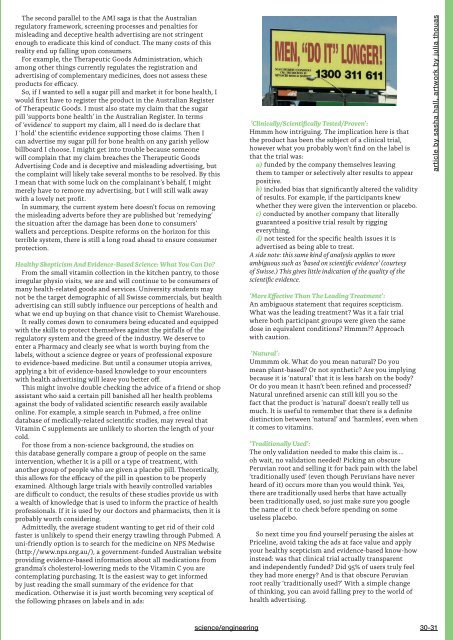Lot's Wife Edition 1 2017
Create successful ePaper yourself
Turn your PDF publications into a flip-book with our unique Google optimized e-Paper software.
The second parallel to the AMI saga is that the Australian<br />
regulatory framework, screening processes and penalties for<br />
misleading and deceptive health advertising are not stringent<br />
enough to eradicate this kind of conduct. The many costs of this<br />
reality end up falling upon consumers.<br />
For example, the Therapeutic Goods Administration, which<br />
among other things currently regulates the registration and<br />
advertising of complementary medicines, does not assess these<br />
products for efficacy.<br />
So, if I wanted to sell a sugar pill and market it for bone health, I<br />
would first have to register the product in the Australian Register<br />
of Therapeutic Goods. I must also state my claim that the sugar<br />
pill ‘supports bone health’ in the Australian Register. In terms<br />
of ‘evidence’ to support my claim, all I need do is declare that<br />
I ‘hold’ the scientific evidence supporting those claims. Then I<br />
can advertise my sugar pill for bone health on any garish yellow<br />
billboard I choose. I might get into trouble because someone<br />
will complain that my claim breaches the Therapeutic Goods<br />
Advertising Code and is deceptive and misleading advertising, but<br />
the complaint will likely take several months to be resolved. By this<br />
I mean that with some luck on the complainant’s behalf, I might<br />
merely have to remove my advertising, but I will still walk away<br />
with a lovely net profit.<br />
In summary, the current system here doesn’t focus on removing<br />
the misleading adverts before they are published but ‘remedying’<br />
the situation after the damage has been done to consumers’<br />
wallets and perceptions. Despite reforms on the horizon for this<br />
terrible system, there is still a long road ahead to ensure consumer<br />
protection.<br />
Healthy Skepticism And Evidence-Based Science: What You Can Do?<br />
From the small vitamin collection in the kitchen pantry, to those<br />
irregular physio visits, we are and will continue to be consumers of<br />
many health-related goods and services. University students may<br />
not be the target demographic of all Swisse commercials, but health<br />
advertising can still subtly influence our perceptions of health and<br />
what we end up buying on that chance visit to Chemist Warehouse.<br />
It really comes down to consumers being educated and equipped<br />
with the skills to protect themselves against the pitfalls of the<br />
regulatory system and the greed of the industry. We deserve to<br />
enter a Pharmacy and clearly see what is worth buying from the<br />
labels, without a science degree or years of professional exposure<br />
to evidence-based medicine. But until a consumer utopia arrives,<br />
applying a bit of evidence-based knowledge to your encounters<br />
with health advertising will leave you better off.<br />
This might involve double checking the advice of a friend or shop<br />
assistant who said a certain pill banished all her health problems<br />
against the body of validated scientific research easily available<br />
online. For example, a simple search in Pubmed, a free online<br />
database of medically-related scientific studies, may reveal that<br />
Vitamin C supplements are unlikely to shorten the length of your<br />
cold.<br />
For those from a non-science background, the studies on<br />
this database generally compare a group of people on the same<br />
intervention, whether it is a pill or a type of treatment, with<br />
another group of people who are given a placebo pill. Theoretically,<br />
this allows for the efficacy of the pill in question to be properly<br />
examined. Although large trials with heavily controlled variables<br />
are difficult to conduct, the results of these studies provide us with<br />
a wealth of knowledge that is used to inform the practice of health<br />
professionals. If it is used by our doctors and pharmacists, then it is<br />
probably worth considering.<br />
Admittedly, the average student wanting to get rid of their cold<br />
faster is unlikely to spend their energy trawling through Pubmed. A<br />
uni-friendly option is to search for the medicine on NPS Medwise<br />
(http://www.nps.org.au/), a government-funded Australian website<br />
providing evidence-based information about all medications from<br />
grandma’s cholesterol-lowering meds to the Vitamin C you are<br />
contemplating purchasing. It is the easiest way to get informed<br />
by just reading the small summary of the evidence for that<br />
medication. Otherwise it is just worth becoming very sceptical of<br />
the following phrases on labels and in ads:<br />
’Clinically/Scientifically Tested/Proven’:<br />
Hmmm how intriguing. The implication here is that<br />
the product has been the subject of a clinical trial,<br />
however what you probably won’t find on the label is<br />
that the trial was:<br />
a) funded by the company themselves leaving<br />
them to tamper or selectively alter results to appear<br />
positive.<br />
b) included bias that significantly altered the validity<br />
of results. For example, if the participants knew<br />
whether they were given the intervention or placebo.<br />
c) conducted by another company that literally<br />
guaranteed a positive trial result by rigging<br />
everything.<br />
d) not tested for the specific health issues it is<br />
advertised as being able to treat.<br />
A side note: this same kind of analysis applies to more<br />
ambiguous such as ‘based on scientific evidence’ (courtesy<br />
of Swisse.) This gives little indication of the quality of the<br />
scientific evidence.<br />
‘More Effective Than The Leading Treatment’:<br />
An ambiguous statement that requires scepticism.<br />
What was the leading treatment? Was it a fair trial<br />
where both participant groups were given the same<br />
dose in equivalent conditions? Hmmm?? Approach<br />
with caution.<br />
’Natural’:<br />
Ummmm ok. What do you mean natural? Do you<br />
mean plant-based? Or not synthetic? Are you implying<br />
because it is ‘natural’ that it is less harsh on the body?<br />
Or do you mean it hasn’t been refined and processed?<br />
Natural unrefined arsenic can still kill you so the<br />
fact that the product is ‘natural’ doesn’t really tell us<br />
much. It is useful to remember that there is a definite<br />
distinction between ‘natural’ and ‘harmless’, even when<br />
it comes to vitamins.<br />
‘Traditionally Used’:<br />
The only validation needed to make this claim is....<br />
oh wait, no validation needed! Picking an obscure<br />
Peruvian root and selling it for back pain with the label<br />
‘traditionally used’ (even though Peruvians have never<br />
heard of it) occurs more than you would think. Yes,<br />
there are traditionally used herbs that have actually<br />
been traditionally used, so just make sure you google<br />
the name of it to check before spending on some<br />
useless placebo.<br />
So next time you find yourself perusing the aisles at<br />
Priceline, avoid taking the ads at face value and apply<br />
your healthy scepticism and evidence-based know-how<br />
instead: was that clinical trial actually transparent<br />
and independently funded? Did 95% of users truly feel<br />
they had more energy? And is that obscure Peruvian<br />
root really ‘traditionally used?’ With a simple change<br />
of thinking, you can avoid falling prey to the world of<br />
health advertising.<br />
article by sasha hall, artwork by julia thouas<br />
science/engineering 30-31

















